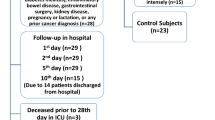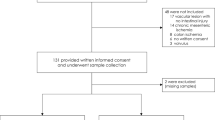Abstract
Experimental studies suggest that the intestinal barrier is affected in ischemic stroke. d-Lactate and intestinal fatty acid-binding protein (IFABP) are markers of intestinal mucosa integrity and barrier function. Our purpose was to evaluate the serum concentrations of these markers in patients with acute ischemic stroke (AIS). We included patients with AIS and used healthy subjects as controls. Clinical, demographic and outcome measures were recorded. Blood was drawn within 24 h of symptom onset. Serum concentrations of d-Lactate and IFABP were determined using commercially available colorimetric and ELISA kits, respectively. We included a total of 61 patients (median age of 64 years). The majority of patients were male (57.4%). The most common cause of stroke was atherosclerosis (34.4%), followed by small-vessel disease and cardioembolic (32.7% each). Mean admission NIHSS score was 8. Median IFABP and d-Lactate concentrations were significantly higher in patients than in controls. Concentrations were not associated with stroke severity or 3-month outcome. Patients with large-artery atherosclerosis and cardioembolic etiology had higher d-Lactate values than patients with small-vessel disease. d-Lactate and IFABP were significantly elevated in patients with AIS. This suggests that there is disruption of the intestinal barrier in patients with AIS.

Similar content being viewed by others
References
Go AS, Mozaffarian D, Roger VL et al (2013) Heart disease and stroke statistics—2013 update: a report from the American Heart Association. Circulation 127:e6-e245
Taylor TN, Davis PH, Torner JC et al (1996) Lifetime cost of stroke in the United States. Stroke 27:1459–1466
Camara-Lemarroy CR, Ibarra-Yruegas BE, Gongora-Rivera F (2014) Gastrointestinal complications after ischemic stroke. J Neurol Sci 346:20–25
Tascilar N, Irkorucu O, Tascilar O et al (2010) Bacterial translocation in experimental stroke: what happens to the gut barrier? Bratisl Lek Listy 111:194–199
Caso JR, Hurtado O, Pereira MP et al (2009) Colonic bacterial translocation as a possible factor in stress-worsening experimental stroke outcome. Am J Physiol Regul Integr Comp Physiol 296:R979-R985
Acosta S, Nilsson T (2012) Current status on plasma biomarkers for acute mesenteric ischemia. J Thromb Thrombolysis 33:355–361
Demir IE, Ceyhan GO, Friess H (2012) Beyond lactate: is there a role for serum lactate measurement in diagnosing acute mesenteric ischemia? Dig Surg 29:226–235
Guo YY, Liu ML, He XD et al (2010) Functional changes of intestinal mucosal barrier in surgically critical patients. World J Emerg Med 1:205–208
Lieberman JM, Sacchettini J, Marks C et al (1997) Human intestinal fatty acid binding protein: report of an assay with studies in normal volunteers and intestinal ischemia. Surgery 121:335–342
Ewaschuk JB, Naylor JM, Zello GA (2005) d-Lactate in human and ruminant metabolism. J Nutr 135:1619–1625
Gajda AM, Storch J (2015) Enterocyte fatty acid-binding proteins (FABPs): different functions of liver and intestinal FABPs in the intestine. Prostaglandins Leukot Essent Fatty Acids 93:9–16
Murray MJ, Gonze MD, Nowak LR et al (1994) Serum D(−)-lactate levels as an aid to diagnosing acute intestinal ischemia. Am J Surg 167:575–578
van der Voort PH, Westra B, Wester JP et al (2014) Can serum l-lactate, d-Lactate, creatine kinase and I-FABP be used as diagnostic markers in critically ill patients suspected for bowel ischemia. BMC Anesthesiol 14:111
Assadian A, Assadian O, Senekowitsch C et al (2006) Plasma d-Lactate as a potential early marker for colon ischaemia after open aortic reconstruction. Eur J Vasc Endovasc Surg 31:470–474
Vermeulen Windsant IC, Hellenthal FA, Derikx JP et al (2012) Circulating intestinal fatty acid-binding protein as an early marker of intestinal necrosis after aortic surgery: a prospective observational cohort study. Ann Surg 255:796–803
Gollin G, Zieg PM, Cohn SM et al (1999) Intestinal mucosal injury in critically ill surgical patients: preliminary observations. Am Surg 65:19–21
Crapser J, Ritzel R, Verma R et al (2016) Ischemic stroke induces gut permeability and enhances bacterial translocation leading to sepsis in aged mice. Aging (Albany NY) 8:1049–1063
Stanley D, Mason LJ, Mackin KE et al (2016) Translocation and dissemination of commensal bacteria in post-stroke infection. Nat Med 22:1277–1284
Swank GM, Deitch EA (1996) Role of the gut in multiple organ failure: bacterial translocation and permeability changes. World J Surg 20:411–417
Gatt M, Reddy BS, MacFie J (2007) Review article: bacterial translocation in the critically ill—evidence and methods of prevention. Aliment Pharmacol Ther 25:741–757
Slaoui T, Klein IF, Guidoux C et al (2010) Prevalence of subdiaphragmatic visceral infarction in cardioembolic stroke. Neurology 74:1030–1032
Abboud H, Labreuche J, Gongora-Riverra F et al (2007) Prevalence and determinants of subdiaphragmatic visceral infarction in patients with fatal stroke. Stroke 38:1442–1446
Rogler G, Rosano G (2014) The heart and the gut. Eur Heart J 35:426–430
Acknowledgements
We wish to acknowledge the staff at the Centro de Investigaciones Biomédicas del Noreste and at the Neurology Service of the Hospital Universitario.
Funding
This research received no specific grant from any funding agency in the public, commercial, or not-for-profit sectors.
Author information
Authors and Affiliations
Corresponding authors
Ethics declarations
Conflict of interest
The authors declare that they no conflict of interest.
Ethical approval
This study was approved by the ethics committee of our institution (Ethics Committee of the School of Medicine, UANL).
Research involving human participants and/or animals
All procedures performed in studies involving human participants were in accordance with the ethical standards of the institutional and/or national research committee and with the 1964 Helsinki declaration and its later amendments or comparable ethical standards.
Informed consent
Informed consent was obtained from all individual participants included in the study.
Electronic supplementary material
Below is the link to the electronic supplementary material.
Rights and permissions
About this article
Cite this article
Camara-Lemarroy, C.R., Escobedo-Zúñiga, N., Guzmán-de la Garza, F.J. et al. d-Lactate and intestinal fatty acid-binding protein are elevated in serum in patients with acute ischemic stroke. Acta Neurol Belg 121, 87–93 (2021). https://doi.org/10.1007/s13760-018-0940-x
Received:
Accepted:
Published:
Issue Date:
DOI: https://doi.org/10.1007/s13760-018-0940-x




